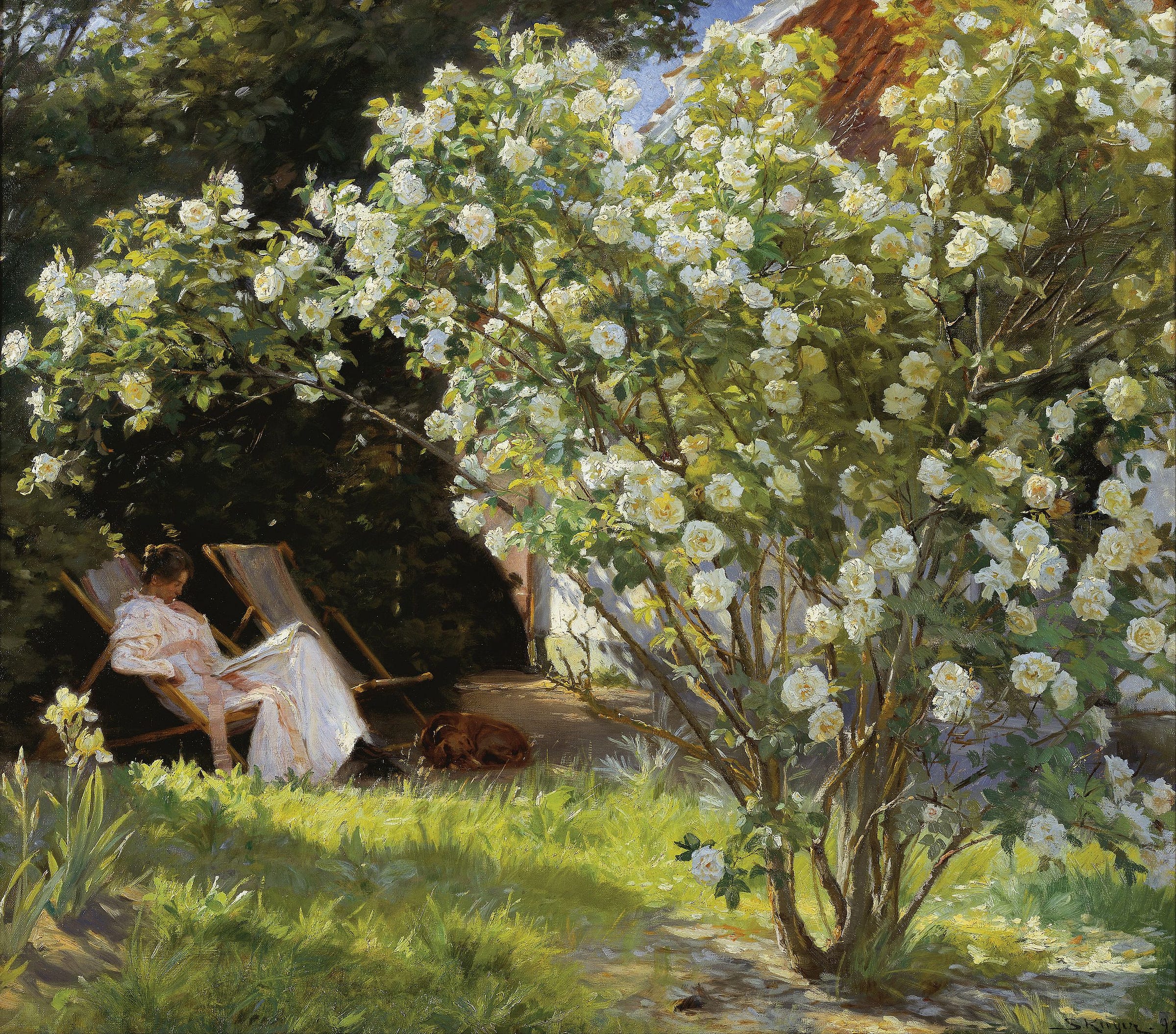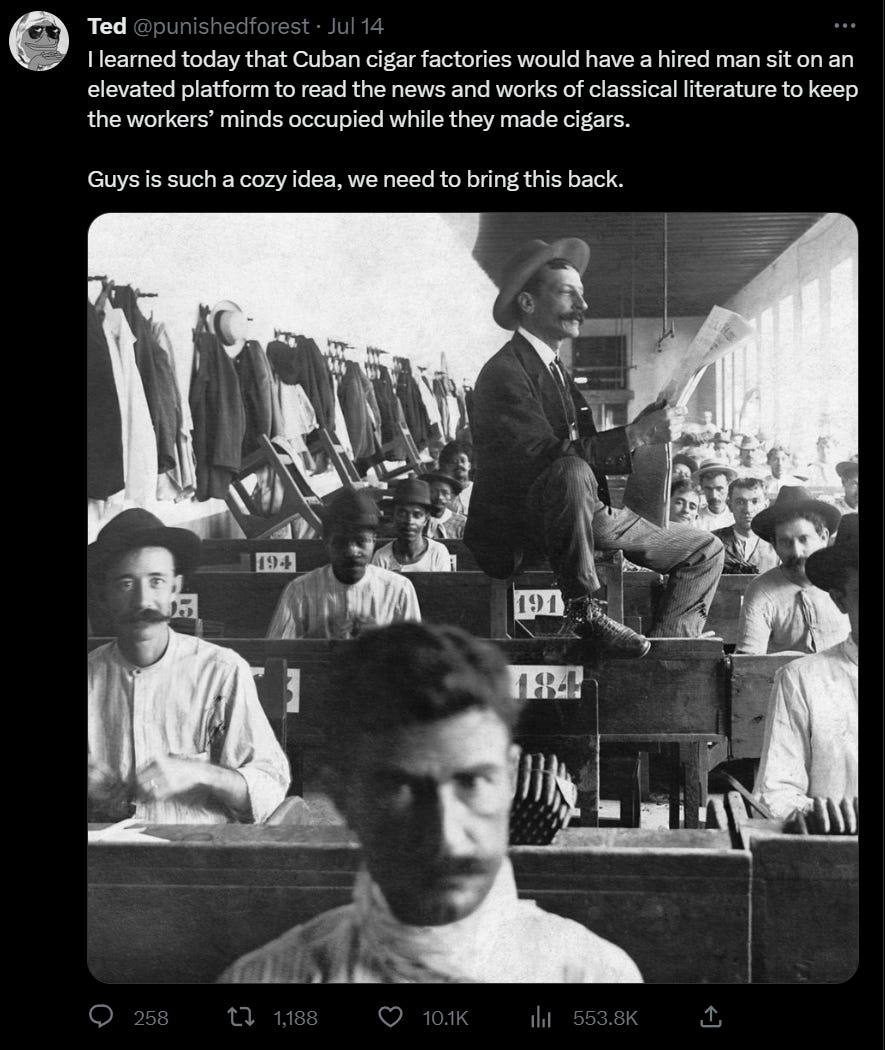Reading Well
Reading is alluring. It has a nameless quality beyond satisfying desires for information and pleasure. Despite more colorful and interactive media, reading text somehow remains more refined, more seductive.
There is a visceral feeling to good reading. Partly this is because reading is nearly solitary.1 At the beginning you are alone with just the characters. By the end, you are alone with just the author. To hear him well demands no other distractions. When one reads, or at least when I read, it is always very slowly and in a voice. Perhaps you have already imagined a voice you are reading this in. Say hello for me.
Reading is letting someone else model the world for you. This is an act of intimacy. When the author is morose, you become morose. When he is mirthful, eventually you may share in it. And after finishing a very good book one is driven a little mad, forced to return from a world that no one nearby has witnessed.
(Book clubs might spoil the effect. So might reading the same thing as everyone else. Choose carefully.)
I have some suggestions on how to read well. If they are forceful it is simply because they are mine. Take what you wish.
~ ~ ~
For man is eager to learn, and his fondness for tales is a prelude to this quality.
— Strabo2
As is a tale, so is life.
— Seneca
You should embrace the visceral quality in reading. Read mostly fiction. Read slowly. There is a kind of marinating that happens with very good works, they are always more than their story. The goal is not to digest information, but to layer over your reality with a fresh coat of moss. Your own world becomes colored by these stories, so it is worthwhile to spend time seeking the excellent works from across cultures and history.
You should have a goal, in some sense, to be influenced by the works that you read. All stories influence you, regardless of how they get to you. A person who reads no great stories will be influenced by the few stories he does come across in life, for better or worse — and I think mostly worse.
If you read what is excellent you will not suddenly become excellent, but a life that is sown with stories is one better positioned to think and dream. The more stories, the more likely one is to understand and identify all the influences that act upon oneself in life.
He who has no poetry in himself will find poetry in nothing. A person that reads no stories is unready for life. A person that reads many stories will be open to yet more stories. The appetite grows by what it feeds on. Dine as best you can.
~ ~ ~
You should start many books and complete few. You should never feel beholden to completing them, there are simply too many worthwhile works to read.
You should re-read the books you adore. With a second reading you will realize just how much you have forgotten, how much you have absorbed, and how much you simply missed the first time, just like you miss any detail of life without repetition. I think this more important than any other suggestion. When you have found a masterpiece, you should reread it just as you would revisit a beloved foreign land, or a faraway friend.
You should buy books on a whim, whenever possible, enough that you start to forget about them. You shouldn't know the whole contents of your own shelves. If you create a home library it should act as one: It is there for you to discover and rediscover, to get lost in. Sometimes you can start or continue a book only when the mood is right, so it is good to have a storehouse ready. But you should also prune the unworthy. A good garden needs both.
You should leave notes in the margins of books, for yourself upon rereading, or referencing, or for your children. Do not listen to the people who shrink from writing in books: If you buy it then it is on your shelf to serve you, and you should make the fullest use of it.
I find it edifying to read by era. For example I read these — over the course of years — not because they were on some list but simply because one begets interest in the next, and they build upon each other.
Reflections on the Revolution in France (Burke)
Napoleon: A Life (Andrew Roberts — twice, one of the best biographies I’ve read)
Memoirs from beyond the Grave (Chateaubriand)
Count of Monte Cristo (Dumas)
War and Peace (Tolstoy — currently reading)
(And perhaps next I will read Zweig’s biography of Fouché.)
Reading culturally adjacent works is especially rewarding. This should come as no surprise, context builds meaning, and opens subtleties that are inaccessible to outsiders. It helps, in the same way, to read around a work to better understand it: First a novel, then a biography of the author, then another novel of hers, etc.
~ ~ ~
Audiobooks are the modern lector:
I think audiobooks are too often ignored (or scoffed at) by some serious readers. They are quite underrated. Quiet listening is a skill, just like reading, that takes some practice. If you read like I do, very slowly with a voice in your head, you begin to catch the same feeling.
If you are too distracted to listen to audiobooks well, they are still an excellent way to re-read works that you have already read. Since you are already familiar with the work, re-reading by audiobook has little penalty for zoning out for a minute, or paying attention to the road, or other little context switches.
Audiobooks vary tremendously in quality. The performer is almost as important as the author. It is worthwhile to seek out recommendations from a trusted friend or admired listener. I think in general older works lend themselves better to audio format, especially novels that were originally published as serials, like The Count of Monte Cristo and War and Peace, because the pacing of serialized novels necessitates some repetition. And of course old stories meant for oral retellings lean heavily on repetition, like The Odyssey,3 and so also shine as audiobooks.
~ ~ ~
I am tempted occasionally to give broad recommendations on what to read, but I think this is usually a mistake. The best recommendations are always personal. There is usually some event or mood or season of life that makes one thing more poignant than another.
I should mention that I am not opposed to non-fiction. In fact I may like memoir — the rare good ones — most of all. But I think what is most valuable to read are the category of works that resist summary, and the commonplace nonfiction books rarely fulfill that. Of the worst offenders there is sometimes a book review that finds itself superior to the book.
I also tend to stress fiction because I think, especially among my professional peers in the industry of software, that there is too great a fondness for non-fiction. I think this arises from a belief that superior knowledge of the world comes from non-fiction. This thought is attractive to people who build systems, but over-systematizing and seeing systems in everything can be a failure mode. Careful descriptions and summaries miss too much of the world. Hard distinctions make bad philosophy.4 Reading fiction helps you become an unsystematic thinker, something that is equally valuable but more elided by some engineers. It is easy to maintain an intellectual rigidity. It takes more care to maintain a loose poeticism of thought.
I hope you find something magnificent to read.
As ever,
s s
If you liked this post, you may also find The Hidden Storehouse useful, which is about language and thinking well. And Audiobooks Are Books and They’re Also Practice.
Any media viewing can be a solitary pursuit of course, but I think the feeling is near-unique. To get a photographic equivalent of text you would need, maybe, every picture to have someone in the scene glancing into the camera, at you. A few movies do come close to achieving this effect, like Tarkovsky’s Stalker (1979). But movies that are too self-conscious about the audience lose all serious effect.
The quote continues:
It is fondness for tales, then, that induces children to give their attention to narratives and more and more to take part in them. The reason for this is that myth is a new language to them — a language that tells them, not of things as they are, but of a different set of things. And what is new is pleasing, and so is what one did not know before; and it is just this that makes men eager to learn. But if you add thereto the marvelous and the portentous, you thereby increase the pleasure, and pleasure acts as a charm to incite to learning.
Monte Cristo narrated by Bill Homewood and War and Peace narrated by Neville Jason are both excellent. As for The Odyssey, there may be newer or better more recent performances but I am most fond of the performance by Ian McKellen (1999), despite the weaker audio fidelity.
Hard distinctions make bad philosophy. This is something John McCarthy, the computer scientist who created the Lisp programming language and coined the term Artificial Intelligence, used to say.




"It is easy to maintain an intellectual rigidity. It takes more care to maintain a loose poeticism of thought." This is an underrated sentiment in a time of polarized ideologies!
This is a great list of rules (that aren't really rules) for reading. I feel like you managed to capture the romance of reading and some good reasons to prefer fiction. For me, I think much of the alluring nature of reading comes from a feeling of absorption. When I read, I become absorbed in a narrative that's different from the self-narrative that most of us experience day in and day out, and generally speaking, much more pleasurable!
I can't recommend Zweig’s biography of Fouché enough. Give it a try.